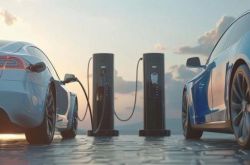Xiaomi YU7 Secures Impressive 289,000 Pre-Orders in Just One Hour: Who Else is Feeling the Heat Besides Tesla?
![]() 06/30 2025
06/30 2025
![]() 622
622
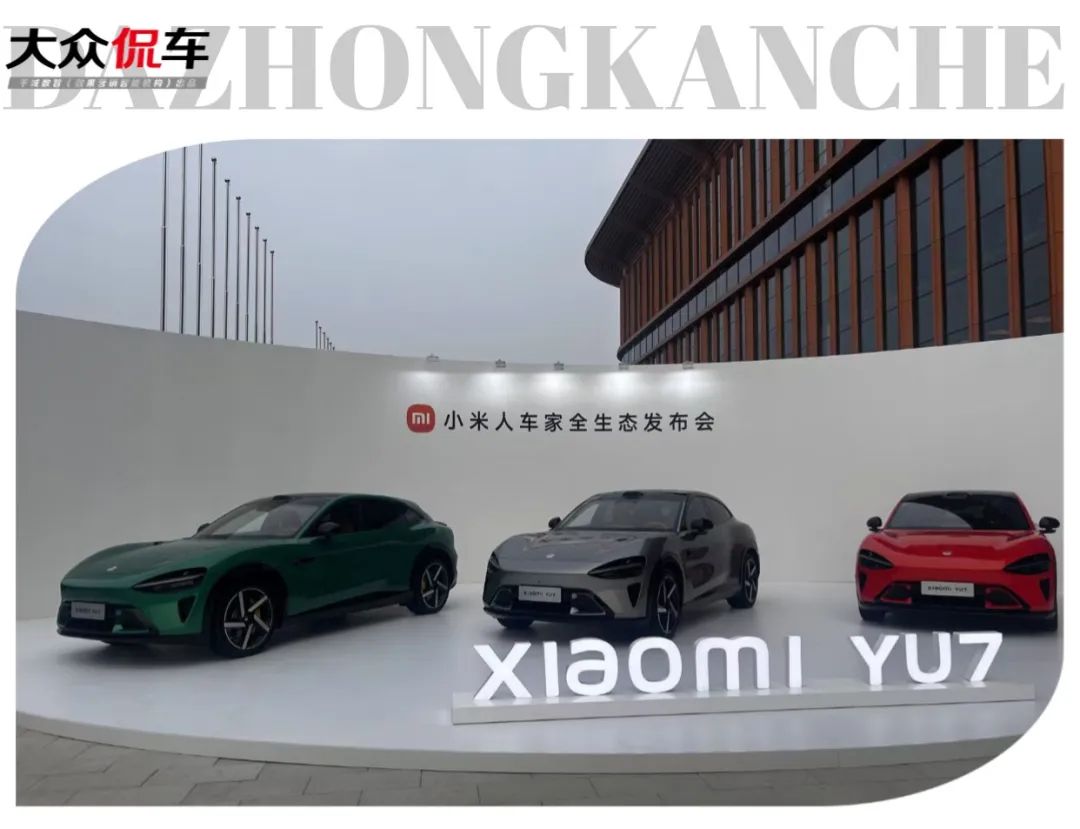
TEAM
Typesetting: Chen Yujie
Images: Sourced from the internet, please remove if infringing
Produced by Qiancheng Digital Intelligence (Effective Marketing Intelligence Agency)
In just three minutes, Xiaomi YU7 surpassed 200,000 pre-orders, reaching an astonishing 289,000 within an hour of its debut. This marked a bold statement to the entire automotive industry.
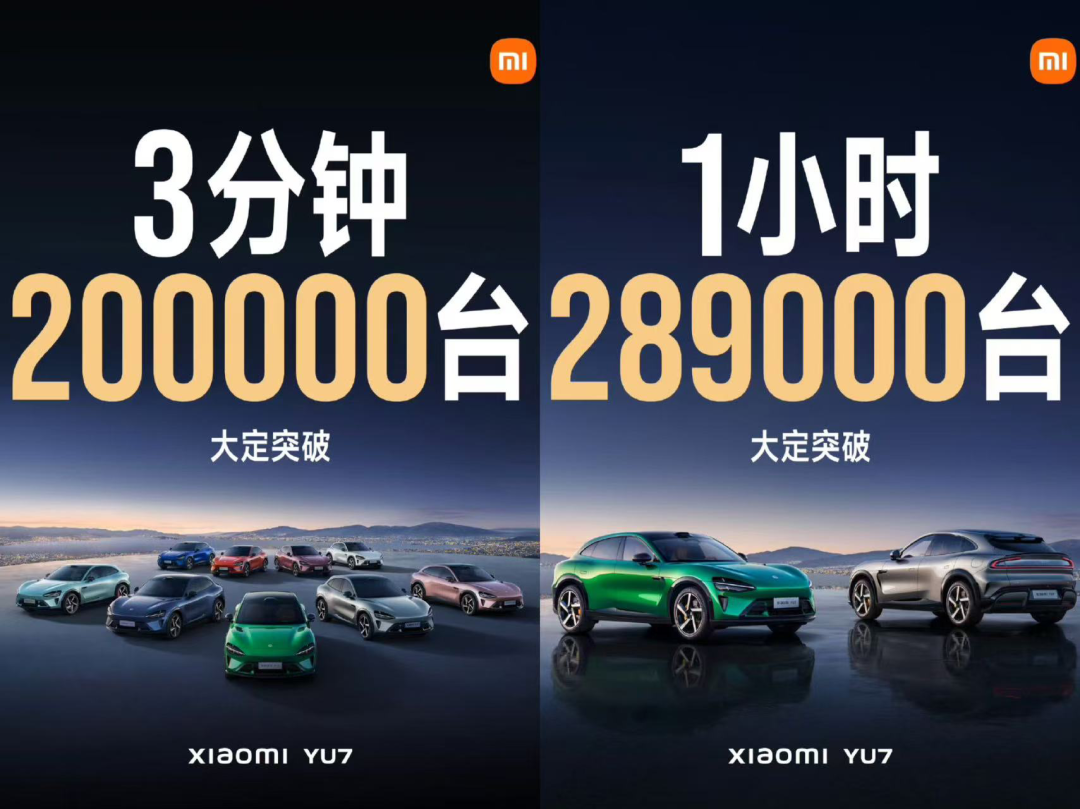
What does this signify? Recall that Xiaomi's previous model, the SU7, achieved 10,000 pre-orders in four minutes, 20,000 in seven minutes, and only 88,900 in 24 hours. Comparatively, in 2024, Li Auto, NIO, and Xpeng delivered 504,500, 221,900, and 190,000 vehicles respectively. In essence, Xiaomi YU7's pre-orders for a single model in just one hour exceeded the annual deliveries of multiple NIO and Xpeng models combined and surpassed Li Auto's half-year deliveries.
How much does this hot-selling new car cost? Launched on June 26, Xiaomi YU7 comes in three versions: Standard, Pro, and Max, priced at 253,500 yuan, 279,900 yuan, and 329,900 yuan respectively. According to Xiaomi Group Chairman and CEO Lei Jun, the pricing decision was made in just five minutes, aiming to undercut Tesla Model Y across all variants. Model Y, with its Rear-Wheel Drive, Long Range Front-Wheel Drive, and Performance versions priced at 263,500 yuan, 313,500 yuan, and 354,900 yuan respectively, finds Xiaomi YU7 priced lower across all three versions.

Reviewing the launch event, it becomes evident that pricing is but one factor behind Xiaomi YU7's explosive popularity. While technology forms the bedrock of automotive R&D, it's humanization that sets it apart. Perhaps only Lei Jun, in the Chinese automotive market, grasps this essence. Hence, in introducing Xiaomi YU7, Lei Jun not only highlighted basic configurations like appearance, interior, performance, range, and intelligence but also emphasized technologies that are "industry basics but rarely practiced."
For instance, Xiaomi YU7, in collaboration with multiple hospitals, developed a motion sickness relief mode that reduces motion sickness incidence by 51% and delays its onset by 16%, addressing the common user complaint of feeling sick in electric cars. Another example is the Xiaomi Super AI Assistant, which allows users to locate their car with a simple command, providing nearby landmarks for easy navigation. Furthermore, the car's 16 magnetic mounting points support customized Bluetooth buttons, tissue boxes, and other accessories, ensuring even a pack of tissues has a dedicated storage space in Xiaomi YU7. While Lei Jun may not be the most seasoned "automotive veteran," he certainly understands users.
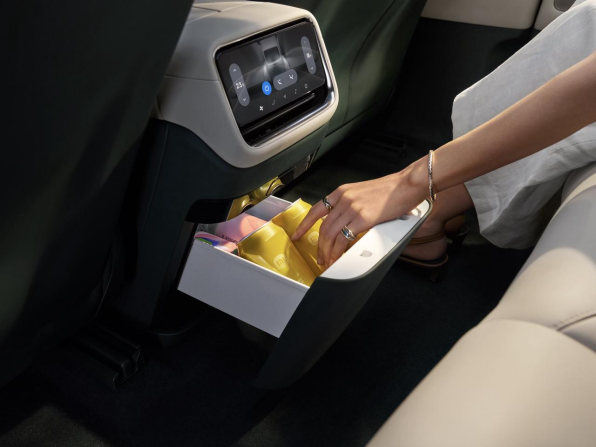
These "emotional values" imparted by Lei Jun have contributed to Xiaomi YU7's success and will keep competitors awake at night. While Xiaomi YU7 clearly benchmarks against Model Y, it's the entire Chinese new energy automotive industry that may truly be feeling the heat. Previously, they struggled to compete in marketing and user understanding; now, they face intense sales pressure too.
Besides Tesla, who else is feeling the panic?
"If I were Musk, I would have lowered the price by 20,000 yuan before today's YU7 launch, making it difficult for Mr. Lei to proceed on stage," quipped some.
With Xiaomi YU7 securing nearly 300,000 pre-orders in just one hour, many netizens suggested that Tesla Model Y's position as the SUV sales champion was at risk, considering Xiaomi YU7's configurations mirror those of Model Y.
In terms of space, Xiaomi YU7 boasts a wheelbase of 3000mm, surpassing Model Y's 2890mm. For range, under CLTC conditions, YU7 offers 760km-835km, significantly outstripping Model Y's 593km-719km.
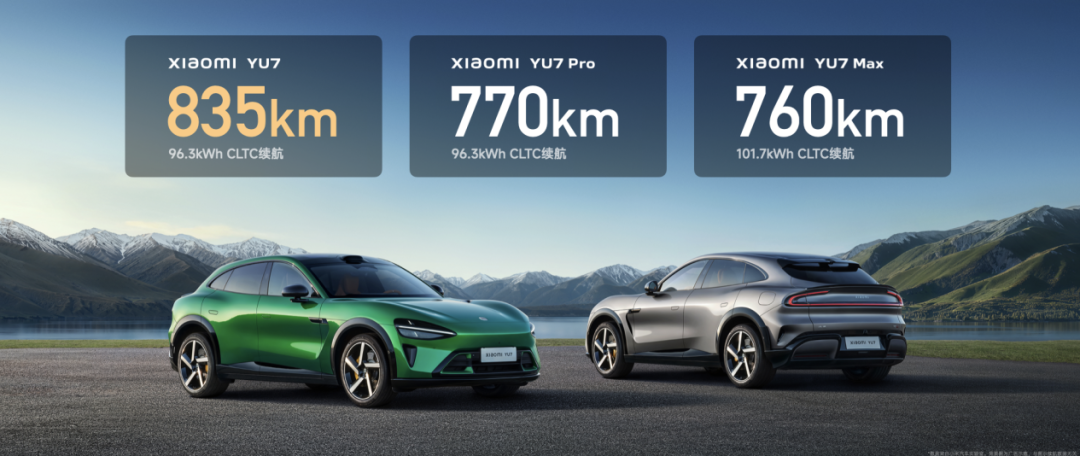
Despite Lei Jun consistently benchmarking Model Y during the launch and previously emphasizing that "domestic brands are not competitors," everyone recognizes that Xiaomi YU7's launch has left not Tesla, but Chinese new energy automotive competitors in the same price range, the most perturbed.
On the eve of Xiaomi YU7's official launch, leaders from new energy automotive brands such as Li Xiang of Li Auto, He Xiaopeng of Xpeng Motors, Li Bin of NIO, and others forwarded Lei Jun's Weibo post to congratulate YU7's launch. However, seeing Xiaomi YU7's pre-order data might keep them awake all night.
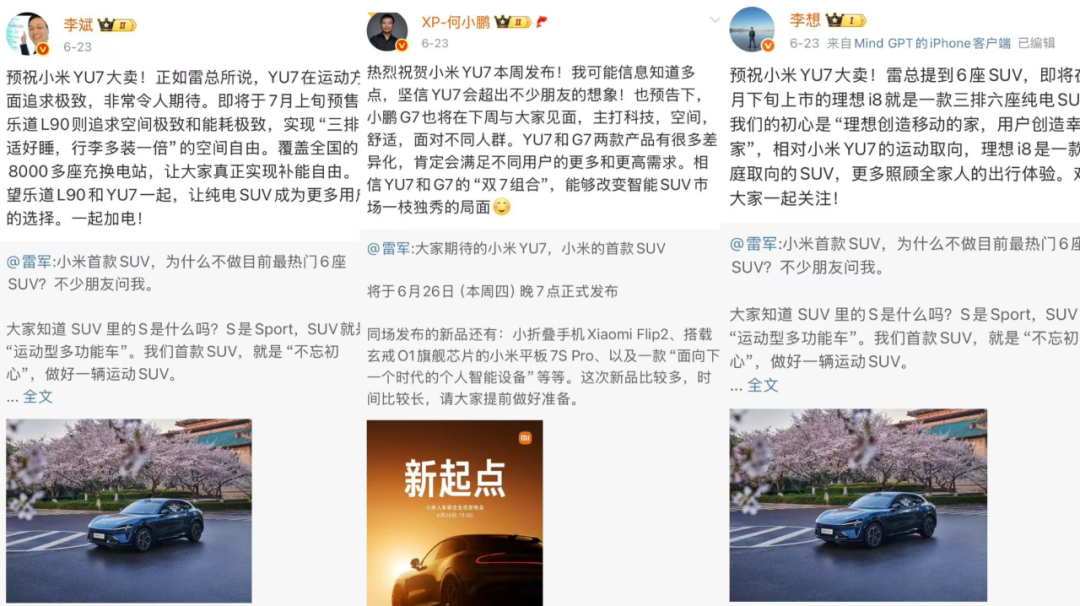
Currently, in the mid-to-large SUV market targeted by Xiaomi YU7, models like Li Auto L6, Xpeng G9, NIO ES6, AITO M7, AITO R7, Tang L DM, and Lunan FREE will all face competition from Xiaomi YU7. Among these competitive products, only Li Auto L6 has a monthly sales volume exceeding 10,000 units.
This market has long been a red ocean. Data from the China Passenger Car Association shows that sales of mid-to-large SUVs in the first five months were 356,000 units, down 7.8% year-on-year; market share was 4%, a decrease of 0.7 percentage points year-on-year. Therefore, as Xiaomi YU7's sales grow, it will inevitably impact competitors' sales, causing their market share to decline.
To maintain market share, Chinese new energy automotive competitors have two options: price cuts and innovation. When Xiaomi SU7 was launched, competitive models like Zeekr and NIO adopted measures like price cuts and innovation to absorb many of Xiaomi SU7's overflow orders. With Xiaomi YU7's launch, competitors may resume price-cutting measures. On the launch day, HarmonyOS Intelligent Travel announced a 20,000 yuan price reduction for all AITO models, but for unknown reasons, this announcement was deleted in the afternoon. From another perspective, Xiaomi YU7's launch may intensify the "price war."
Besides Chinese new energy automotive competitors, BBA and some joint venture brands will also face stiff competition. On one hand, Xiaomi YU7's high-end version enters BBA's main sales price range; on the other hand, Xiaomi YU7 matches BBA in performance and range, leaving the latter with only two options: active or passive price cuts.
Two Major Hurdles Facing Xiaomi YU7
"As long as Xiaomi doesn't mess up, its 'dynasty foundation' can be considered laid," joked netizens after seeing Xiaomi YU7's pre-order data. However, despite the optimistic sales of Xiaomi SU7 and YU7, two major hurdles remain before its foundation can be considered solid.
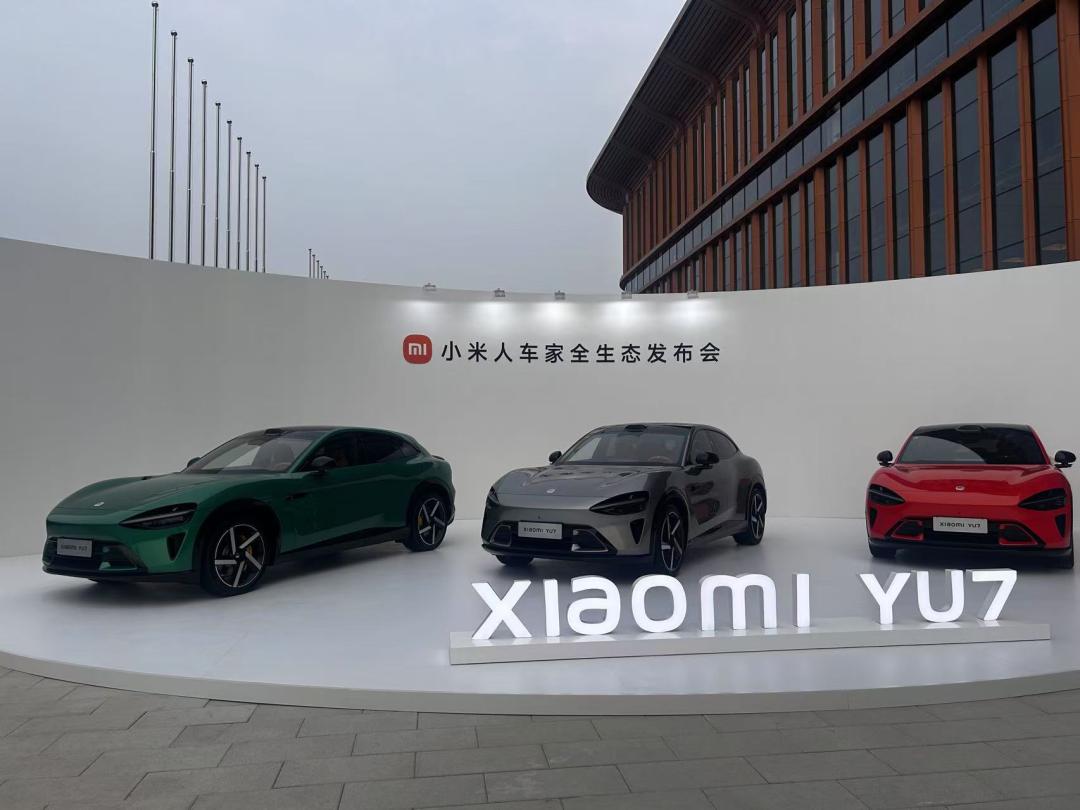
The first hurdle is production capacity. Lei Jun's title of "King of Undelivered Cars in Beijing" is not an exaggeration. A car blogger revealed that Xiaomi SU7 had accumulated approximately 430,000 locked orders, but as of now, only 258,000 units have been delivered, leaving 172,000 units undelivered. If users buy Xiaomi SU7 now, they will have to wait at least 8 months. Coupled with Xiaomi YU7's 289,000 pre-orders, Xiaomi currently has 461,000 new vehicles waiting to be delivered.
In contrast to the booming sales orders, Xiaomi currently operates only one vehicle manufacturing plant in the Beijing Economic-Technological Development Area, with an annual production capacity of 150,000 units. Although the second phase of its intelligent manufacturing industrial base for Xiaomi YU7 was inspected and accepted on April 22, the production date has not yet been determined. Even if production starts immediately, the combined annual production capacity of the two phases, totaling 300,000 units, cannot meet the current backlog of 461,000 undelivered orders.
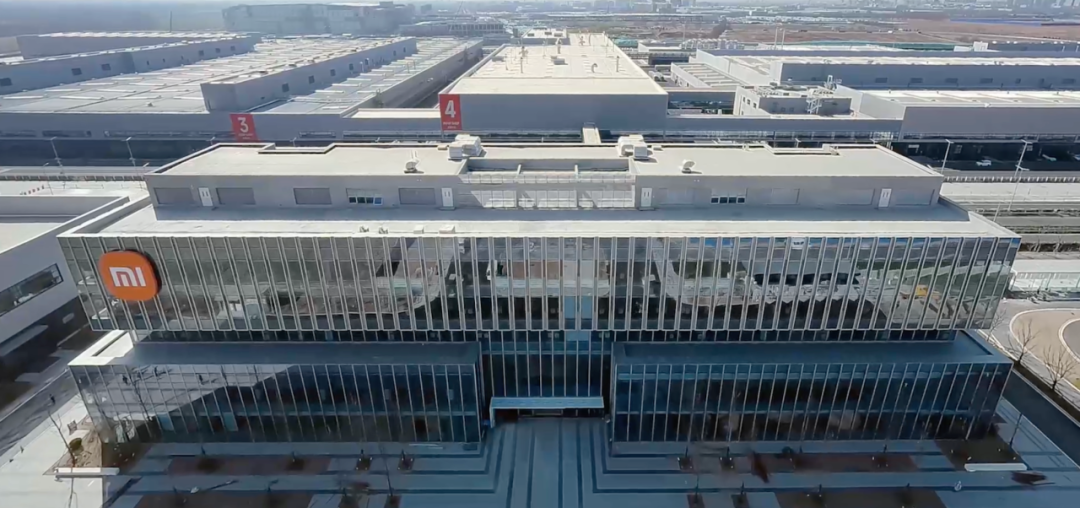
During the launch event, Lei Jun mentioned that customers with locked orders for SU7 but not yet delivered could switch to YU7 within 72 hours. However, for SU7 locked-order owners, immediate delivery of either SU7 or YU7 remains impossible.
The inability to increase production capacity not only affects user deliveries and thus delivery volumes but also impacts commission payments for Xiaomi automotive sales staff. Recently, a salesperson at a Xiaomi automotive dealership said, "Although Xiaomi automotive sales are good and there is no order pressure, we only receive commissions after users take delivery of their vehicles." However, there are reports that Xiaomi's third factory is under construction.
The second hurdle is public scrutiny stemming from the previous SU7 intelligent driving incident. On the launch day, Lei Jun posted three car-related contents, two of which focused on safety. During the launch event, Lei Jun clearly stated, "Safety is the premise, safety is the foundation, safety is everything. When we first started making cars, we attached great importance to safety." These efforts aimed to dispel public doubts caused by the previous SU7 intelligent driving incident.
With Xiaomi YU7, Lei Jun not only wanted to convey that the vehicle is very safe but also showcased Xiaomi's attitude towards safety. Before its launch, Xiaomi YU7 underwent rigorous vehicle testing over 539 days, covering 296 cities, from Turpan in summer to Mohe in winter and to Tibet's Ali region at an altitude of 5380 meters, with a total road test mileage of 6.49 million kilometers.
Additionally, during the launch event, Lei Jun revealed that Xiaomi YU7 successfully completed a 24-hour endurance challenge, traveling a total of 3944 kilometers, surpassing Porsche Taycan and the Mercedes-Benz CLA electric prototype.
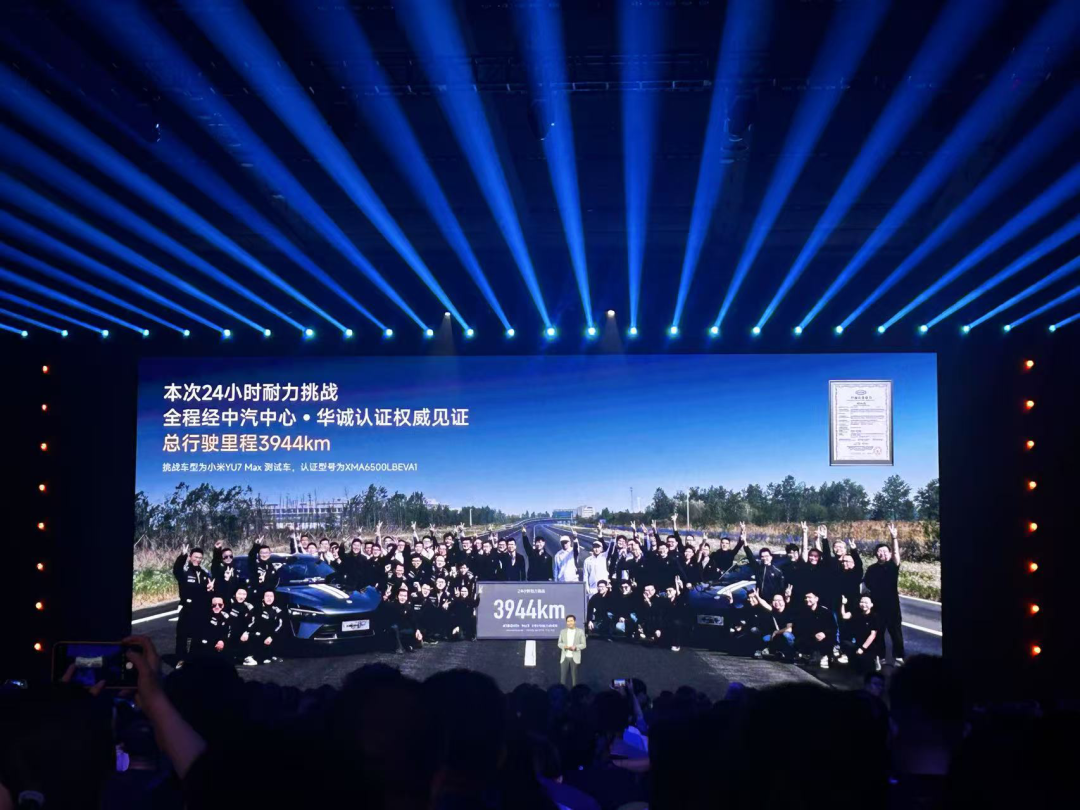
Focusing on intelligent driving, Lei Jun didn't elaborate much, only revealing two key pieces of information during the launch event: First, all versions of the new car come standard with a Thor chip offering 700 TOPS of computing power, one lidar, one 4D millimeter-wave radar, 11 high-definition cameras, and 12 ultrasonic radars, with all three versions supporting end-to-end assisted driving. Second, it is expected to upgrade to Xiaomi XLA large model in the second half of this year.
KanCheShuo
Lei Jun stated that Xiaomi YU7 marks Xiaomi's true entry into the automotive industry's main battlefield, where it will face the strongest opponents and the most brutal competition. The cruelty of this battle lies in the fact that the market will not grant Xiaomi many opportunities to make mistakes. Facing Tesla's price cuts, BYD's scale advantage, and technological challenges from brands like Huawei and NIO, Xiaomi YU7 must excel in product quality, brand recognition, and supply chain efficiency simultaneously.
If successful, Xiaomi will truly join the first tier of smart electric vehicles, completing its transformation from a "crossover player" to an "industry giant." However, if it experiences another public opinion crisis like the SU7 intelligent driving incident, Xiaomi YU7 and Lei Jun's subsequent automotive path may fall into a war of attrition, even affecting the valuation logic of the entire Xiaomi ecosystem.
This is a battle for survival. And the market is waiting for an answer.

